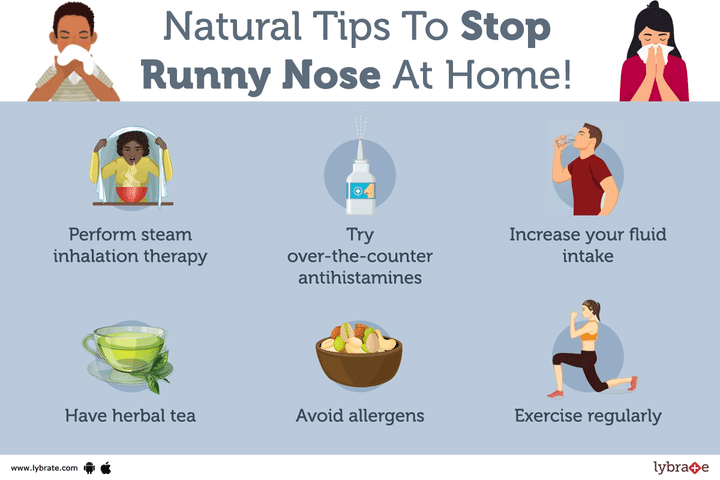Get the App
For Doctors
Login/Sign-up
Last Updated: Mar 21, 2023
BookMark
Report
12 Tips to Relieve Your Runny Nose or Nasal Congestion
What is Nasal Congestion?
Nasal congestion is a condition in which the nasal passages become blocked or stuffed up, making it difficult to breathe through the nose. It can be caused by allergies, colds, sinus infections, or other medical conditions.
What are the signs and symptoms of Nasal Congestion?
The signs and symptoms of nasal congestion include:
- Discomfort or pain in the nose and cheeks.
- Thick mucus accumulation in the throat or dripping from the back of the nose.
- Blockage of the airways resulting in difficulty breathing through the nose, accompanied by a whistling or wheezing sound when you exhale through your nose.
- Postnasal drip, which is thin watery fluid that drips down your throat from your nasal passage due to blocked sinuses that cause crusts to form on your tonsils.
- One-sided facial pain caused by inflammation around your sinuses, accompanied by persistent headaches in some cases.
- A feeling of fullness or pressure around your eyes, forehead, and cheeks due to swollen sinus cavities pushing against them.
What are possible complications of Nasal Congestion?
- Sinus Infections: If a cold or allergies cause the nasal congestion to last for weeks at a time, it can cause inflammation and swelling that block mucous from draining from the sinuses leading to sinus infections.
- Ear infections: Congestion can force mucous into the ears, preventing them from draining properly and allowing bacteria to grow in middle ear cavities leading to painful ear infections.
- Respiratory tract infections: An infection such as bronchitis or pneumonia are serious complications that may arise if colds and allergies linger long enough.
- Asthma attacks: According to some studies, untreated nasal congestion may increase asthma severity or lead to compromised lung function.
12 Tips to Relieve Your Runny Nose or Nasal Congestion
Try natural remedies: Some of the natural therapies you might try are:
- Boil a few cloves of garlic in a glass of milk and drink it before bedtime.
- Add some black pepper powder to a glass of warm water and drink it twice a day to reduce congestion.
- Boil some basil leaves in water for 5 minutes, strain it, add honey to taste, and drink it twice a day for relief from congestion.
- Make an herbal tea by adding some cardamom powder, cinnamon powder, ginger powder and clove powder to boiling water, strain it, add honey to taste, and drink it twice a day for relief from congestion.
- Take over-the-counter decongestants: Over-the-counter decongestants like pseudoephedrine or phenylephrine can help reduce inflammation and provide your nose with temporary relief.
- Increase your fluid intake: Drink lots of warm fluids throughout the day, such as herbal teas and soups. This will help to thin mucus and make it easier to expel from the nose.
- Stay warm: Cold temperatures can cause nasal membranes to swell, making congestion worse. Keeping warm helps reduce inflammation in the nasal passages, allowing for better airflow through them.
- Avoid allergens: If allergies are the cause of your nasal congestion, you will want to avoid contact with known allergens as much as possible to prevent further symptoms from occurring. This includes pollen, dust mites, molds and pet dander.
- Use a neti pot or other nasal irrigation device: Nasal irrigation devices rinse away mucus and pollen from the inside of your nose, providing relief from congestion and other allergy-related symptoms.
- Apply essential oils: Certain essential oils like peppermint oil or eucalyptus oil have been found to provide relief from irritation caused by colds or allergies due to their anti-inflammatory properties. You can apply these oils directly on the area or inhale them through aromatherapy for best results.
- Try over-the-counter antihistamines: Medications such as diphenhydramine (Benadryl) or loratadine (Claritin) reduce histamine production, which can help reduce swelling in your nasal passages and allow you to breathe more easily.
- Suck on menthol candies: Menthol candies act as an expectorant which helps open up nasal passageways by thinning out mucus secretions. Also sucking on something strong will also stimulate salivation which moisturizes irritated membranes in the throat and sinuses providing some relief from symptoms of congestion.
- Perform steam inhalation therapy: Steam inhalation therapy is often recommended for relieving sinus congestions due to its impactful effects. Simply sitting with your head bent over a pan of boiling water wearing a towel over it while breathing deeply is an effective way of engaging this method although there are different varieties that could be done involving use of herbs/essential oils etc., depending upon one’s needs.
- Avoid some foods: Reduce consumption of sugar, processed food items which if taken excessively can cause inflammation resulting in congestive symptoms in the body; so switch these items out for fresh fruits and vegetables instead.
- Exercise: Exercise regularly as this helps open nasal passages by increasing circulation throughout the body.
If the aforementioned measures are ineffective, you may need to consider surgical treatments.
What are the surgical treatments for Nasal Congestion?
Surgical treatments for nasal congestion include:
- Endoscopic Sinus Surgery: Carried out by inserting an endoscope (fibreoptic camera) into the nose and using micro-instruments to remove any blockages or enlarge sinus openings. This is sometimes known as Functional Endoscopic Sinus Surgery (FESS).
- Septoplasty: This procedure involves straightening the septum on the inside of the nose to reduce any obstruction in breathing due to a deviated septum.
- Turbinate Reduction: This procedure reduces the size of enlarged turbinates that are causing nasal congestion by cutting them away from their blood supply and allowing them to shrink back to normal size.
- Balloon Sinuplasty: This involves inserting a balloon into blocked nasal passages and inflating it to remove any blockages and open up passageways for better air flow through the nose.
Best doctors to consult for Nasal Congestion?
- Otolaryngologist: An otolaryngologist (ear, nose and throat doctor) or a specialist in allergic rhinitis, are best to consult for nasal congestion. An otolaryngologist diagnoses and treats the diseases that affect the organs of the upper body such as noses, ears and throats.
- Allergy specialist: An allergy specialist diagnoses and treats disorders related to allergies, like allergic rhinitis which causes allergic reactions related to the nose including nasal congestion.
- General practitioner: A person can also consult a general practitioner if they have mild symptoms of nasal congestion as they can advise treatments such as decongestive medications or other methods of symptom management.
In case you have a concern or query you can always consult a specialist & get answers to your questions!



+1.svg)
